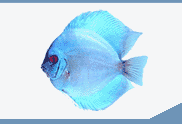 |
 |
Usually loss of balance is caused by one of the following conditions:
- Water quality: Poor water conditions (ammonia, nitrite, foul water)
- Digestive system blockages: Dry foods that swell up inside fish, parasites (flagellates or worms) (usually bloating is visible)
- Swimbladder problem: Bacterial, drop in temperature, flagellates, tumor (Untergasser, 1989)
- Medication reaction
- Blood flagellates (Untergasser, Handbook Fish Diseases, 1989 by TFH Publications)
Treatment
- Check water parameters, do large water changes
- Look for bloat, add Epsom salt 1 to 2 tablespoons/10 gallons, treat for internal parasites if Epsom salt does not relieve bloat
- Sometimes a pH of 5.0 to 6.0 may help if it is infection
- Salt at 1 to 2 tablespoons/10 gallons help ease stress and fight infection
- Antibiotics may help
Source
Handbook of Fish Diseases by Dieter Untergasser, TFH Publications, Inc 1989
Here are some links with additional information about Headstanding:
- http://www.fishyfarmacy.com/Diseases/Locomotor%20Disorders.html
This article suggests a swimbladder problem, possible cause by a temp spike. Another cause may be bacterial of the opening to the swimbladder. Treatment with Quinine sulfate may help at 1 capsule/14 gallons every day for 4 to 5 days.
- http://www.dphnet.com/sub-article/cat-02/headstand.shtml
This article suggests causes may include bacteria or temp change. Treatment is to put them in a tank with shallow water at 82 F. and possible use of antibiotic. Plus salt at 1gm/gal. Keep the water clean.
- http://www.bettadreams.com/diseases.html
This article suggests either a bacterial or viral infection of the swimbladder or an intestinal obstruction.
- http://www.aquaworldnet.com/faq/disease-fw.html
This author suggests either an intestinal obstruction or bacterial infection. Treatment by antibiotics in food or water. Intestinal obstruction could be caused by swelling of peooet food in the fishes digestive tract.
- http://pub5.ezboard.com/fhobbyfrm14.showMessage?topicID=28.topic
In this article Jim Quarles talks about possible causes of swimming disorders, including intestinal blockages, infections, or sudden changes in water temp. Treatment may include lowering the water level to just cover the fishes back, salt at 2 teaspoons/10gal, gentle aeration, 90 F, Epsom salt for intestinal blockage at 2 tsp/10gal. Antibiotics if it is bacterial, and clean water conditions.
- http://www.netpets.com/fish/reference/freshref/swimbldr.html
This article deals with swim bladder disease caused by digestive system blockage, bacteria, or virus. Treatment with peas, aspiration of the swim bladder with a needle, or surgery. Prevention is stressed by soaking pellet type food before feeding. And good water quality.
The swim bladder is a sac-like organ that controls buoyancy in fish. In some fish it also aids in respiration and possibly communication. Buoyancy is controlled by filling the sac with air and floating up in the water, or releasing the air in the sac and going down in the water. By equalizing the internal density of the fish with the density in the water surrounding the fish, the fish is able to stay at a certain depth.
Some fish vibrate the swim bladder to create sounds, thought to be used in courtship. The air in the sac also amplifies sound possibly aiding in hearing or feeling.
The sac is connected to the bloodstream by an oval muscle (sphincter). Air moves from the blood to the sac and vice versa by diffusion and the use of pressure. This muscle or the sac itself may become inflamed or infected, thus causing the fish to loose control of buoyancy, if it cannot close, the air in the swim bladder escapes and the fish sinks and may lie on the bottom. If the sphincter cannot open, the air in the swim bladder cannot escape, and the fish is at the surface of the aquarium facing head down (headstanding).
Internet Resources
|
 |




